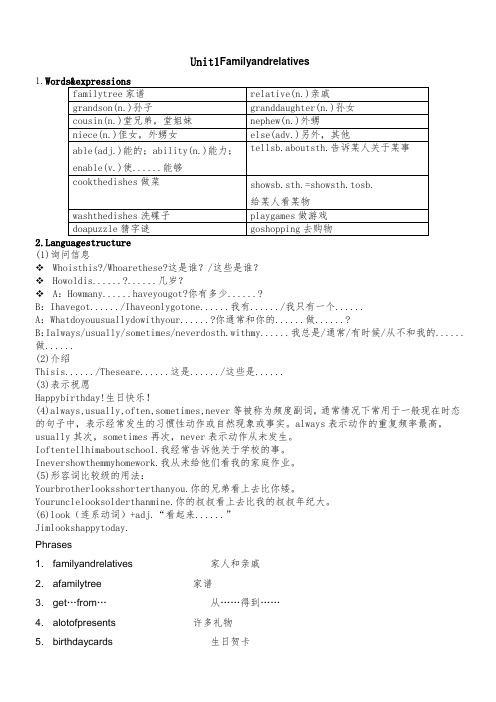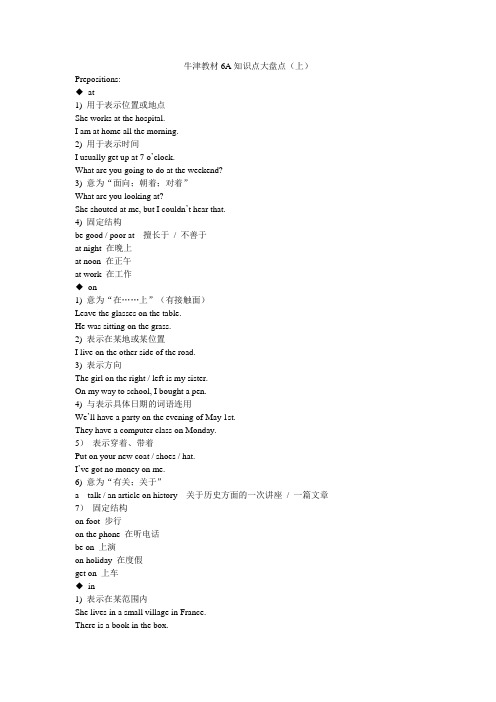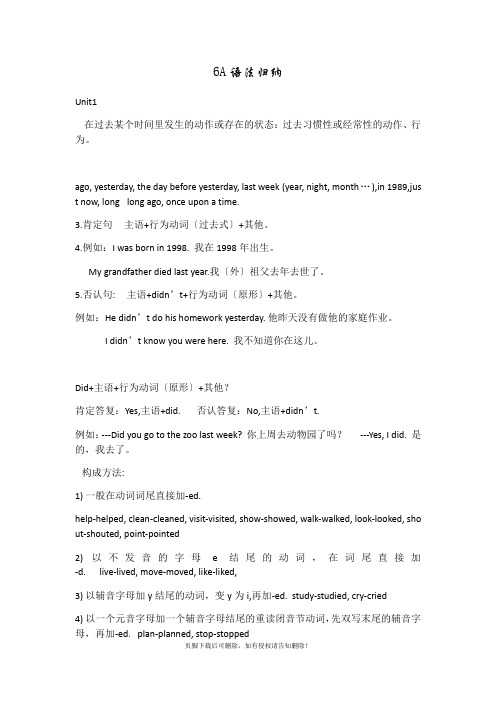牛津英语6A英语语法(一)名词
牛津6A基础知识汇总

牛津6A基础知识汇总Unit 1单词1:always总是 2:question问题 3:ask问请求要求 4:mean意思是意指 5:must必须应当 6:should应当应该7:shouldn’t=should not不应该 8:pick拾采9:public公共的公众 10:sign标志告示牌子 11:cousin堂(表)兄弟姐妹 12:danger 危险 13:away(离)开 14:grass草地草 15:bird鸟 16:cage笼子 17:quiet安静的 18:noise噪声喧闹声 19:smoke吸烟20:litter乱丢杂物 21:park停放(汽车)22:touch触摸 23:suddenly突然(地) 24:something某事某物 25:note钞票纸币26:around周围在附近 27:nearby附近的 28:quickly快地29:keeper看守人 30:point 指 31:fine罚款短语1. four years old 四岁2. ask Ben some questions 问Ben 一些问题3. go in 进去4. stay away 远离5. keep off 远离6. make noise 发出(喧闹)的声音7. talk about 讨论 8. public signs 公共标志9. No smoking 禁止吸烟 10. No littering 禁止乱扔杂物11. No parking 禁止停车 12. Do not touch 禁止触摸13. Danger! 危险 14. No eating or drinking 禁止吃喝东西15. Keep off the grass 远离草地 16. take a walk 散步17. Be quiet 保持安静 18. be back home from the zoo 从动物园回家19. a ten-yuan note 一张十元纸币 20. say to 对……说21. pick up 拾起 22. come up 上来23. point to 指向 24.look around环顾四周25. fine ¥10 罚款10元 26. birds’cage鸟笼27.walk on the grass 在草地上行走 28.ask sb about sth 问某人关于某事29.no one nearby 附近没有人 30.give me ten yuan=give ten yuan to me 给我十元 31.shake one’s head 摇头句型1:He is asking Ben some questions. 他正在问本一些问题。
上海版牛津英语6AUnit1Family and relatives 单词词组语法和练习题

Unit1Familyandrelatives1.(1)❖❖❖AB:A:B:......做(2)(3)(5)(6)look(连系动词)+adj.“看起来......”Jimlookshappytoday.Phrases1. familyandrelatives 家人和亲戚2. afamilytree 家谱3. get…from…从……得到……4. alotofpresents 许多礼物5. birthdaycards 生日贺卡6. happybirthday 生日快乐7. makeabirthdaycardforme. 为我做一张生日贺卡8. oneofyourfamilymembers 你的家庭成员之一9. talkabout 谈论10. goshopping 去购物11. goswimming 去游泳12. gocycling 去骑车5.Let saysomethingabout toyoufirst.(I)6.Iliketogo (shop)withmumandshealwaysbuyssomethingforme.7.Sheisalways (friend)tootherpeople.8.TheSmithsaregoingtovisit (they)friendsinAmerica.9.Therearetwelve (member)inmyfamily.10.Iusuallygototheparkwith (I)parents.11. (this)aremyfamilyphotos,canyoufindme?12.Iusuallygo (swim)insummer.13.Howmany (classmate)arethereinyourclass?14.Bytheway,whatelsedoyoudowith (they)?15.Thisis (Tom)classmate.II.Choosetherightwordsorexpressionstocompletethesentences.(选择适当的单词或短语完成句子)1.I gotoschoolat7:30.10.Weusewatertowashclothes,we (both,also)usewatertocookfoodandmakedrinks.11.SamisAlice’suncle.SoAliceisSam’s (nephew,niece).12. (These,This)aremycousins.IV.Choosethebestanswer.(选择最恰当的答案)()1.Ihavegotalotofbirthdaycards myfamilyandrelatives.A.atB.forC.inD.from()2.Mr.andMrs.Wangaremyparents.Iamtheir .A.sisterB.doctorC.cousinD.daughter()3.–Happybirthdaytoyou!-- .A.ThankyouB.HowareyouC.That’sallrightD.Fine,thankyou()4.Tomsometimes withhisbestfriend,Peter.A.toplaybadmintonB.playsbadmintonC.playingbadmintonD.playbadmintons()5.Theyaremygrandparents.Iam grandson.()()()()()()()()()14. averycoldmorning,theboywasborninapoorfamily.A.InB.OnC.AtD.Under()15.Mygrandfatheris inmyfamily.A.olderB.oldestC.oldD.theoldest ()16.Thisisafriendof .A.theyB.themC.theirsD.their()17. wonderfulpicture!Ilikeitverymuch.A.WhataB.WhatC.HowD.Howa()18.Ihaveonecousin.Shehasonecousin, .A.alsoB.tooC.bothD.either()19.Mariaoftengoesshopping hermother.A.forB.withC.fromD.of()20.What doyouusuallydoonSunday?A.elseB.othersC.anotherD.theother()()()()()()()()()29.Peteralways lunchatschool.Buttomorrowhe athome.A.has;isgoingtohaveB.have;wasgoingtohaveC.has;wasgoingtohaveD.have;isgoingtohave()30.Look!Thesearemy and .A.family;relativeB.family;relativesC.families;relativesD.families;relative ()31.JimandPeterare aboutDanny’sbirthday.A.sayingB.speakingC.talkingD.telling()32.Whatan gameitis!A.exciteB.excitingC.excitedD.excitedly()33.Ienjoyplayingfootballwithmyfatheratweekends.Theunderlinedwordmeans“”.A.wantB.wouldlikeC.likeD.liketo()34.Mygrandfatheralwaystakeawalkafterdinner.Theunderlinedwordmeans“”.A.alreadyB.allthetimeuallyD.sometimes()35.–Thankyouforhelpingme.It’sveryniceofyou.–.14.Mytelephonenumberis.(对划线部分提问)15.Isometimesplaybadmintonwithmyfather.(改为一般疑问句)16.MaryandLucyaremybestfriends.(改为一般疑问句)VI.Choosethewordorexpressionwhichisclosestinmeaningtotheunderlinedpartineachsentences (选择与下列各句中划线部分内容意思接近的单词或短语)1.June28th isAmy’sbirthday.2.Didyouhaveagoodtimeonyoursummerholiday?3.Wouldyoushowmeyourstamps?4.Thepeopleinthatroomaremyauntsanduncles.5.ThissummerholidayLucyisgoingtovisithergrandparentsinChongming. VII.Fillintheblankswiththeverbsintheirproperforms(时态填空)1.Johnnever (do)thecookingathome.2.They (noteat)thetraditionalfoodinChina.3.do,your,you,do,with,youruncle,what,usually。
六年级英语语法训练2 (1)

六年级英语语法训练,你练过了么?牛津英语6A英语语法(一)名词一.名词分可数名词和不可数名词1 可数名词个体名词都是可数名词。
每个可数名词都有其单数和复数形式。
A. 单数表示―一个‖的概念。
用名词的单数时,名词前需加 a 或 an。
如 a book(一本书)、an apple(一个苹果)、an orange(一个橘子)等。
B. 复数表示两个或两个以上的物体。
如two pencils(两枝铅笔)、three weeks(三周)等。
复数形式的构成有两种:规则名词复数形式的构成和不规则名词复数形式的构成。
具体见下表。
规则名词复数形式的构成词形复数形式的构成方法例词大多数名词在词尾加-s。
(在清辅音后读[s],在浊辅音及元音后读[z]。
)cat——catsbook---booksdog----dogsbag——bagsboy--- boys以s、x、ch、sh结尾的名词在词尾加 -es, 读作[iz]。
glass——glassesmatch——matches以辅音字母 +y 结尾的名词把 y 变成 i , 加 -es, 读作[iz] city——cities但专有名词例外,直接在 y后加-s, 读作[z] Germany——Germanys以辅音字母 +o 结尾的名词一般直接加 -es,读作[z]; 某些词例外,加 -s tomato——tomatoes photo——photosKilo--kilos, piano--pianos以元音字母+o结尾的名词直接加 -s, 但读作[z] zoo——zoosradio——radios以f或fe结尾的名词有的直接加 -s, 读作[z] roof——roofs大多数要将f或fe变为v,再加-es,读作[z] leaf——leaveswife——wivesknife--knives不规则名词复数形式的构成复数形式的构成特点例词通过改变词内元音字母man——men foot——feettooth——teeth mouse——mice(老鼠)通过在词尾加-en ox——oxen(牛) child——children单复数形式相同 a sheep——two sheepa deer——two deer(鹿)a Chinese——two Chinese(中国人)注意事项:只能用于复数形式的名词有: clothes, trousers, glasses,单数名词用于复数含义: people, public, police2 不可数名词:有些词在汉语中可数,在英语中却不可数。
牛津6A学习知识点情况总结

牛津英语6A 知识点总结一.名词☆可数名词:可数名词变复数的规则变化不规则变化☆不可数名词:a.b.c.d.e.g.注意:fish 鱼肉(不可数)fish 鱼(可数,单复同形)crab 蟹肉(不可数)crab 螃蟹(可数)☆量词:☆只能接_____________________:a few 几个few 几乎没有many 许多too many 太多☆只能接______________________:a little 一点little 几乎没有much 许多too much 太多too little 太少☆既可以____________________________________:some 许多any 许多plenty of = a lot of=lots of 大量的enough 足够的☆分类:1.___________________________: chicken steak sauages meat2.___________________________: fish crab prawns squid3.___________________________: ice-cream fish balls4.___________________________: milk eggs5.___________________________: chocolate crisps sweets6.___________________________: cakes biscuits bread small cakes7.___________________________: 7-up fruit juice coffee lemonade Coke8.___________________________: carrots onions tomotoes cabbages lettucespotatoes9.___________________________: peaches pineapples oranges pears bananas apples10.___________________________: rice noodles二.冠词☆不定冠词:带有a/an 的词组:a lot of 许多,大量a few 几个a little 一点have a rest 休息have a break 休息have a good time 过得愉快half an hour 半小时☆定冠词:the +形容词的最高级the tallestthe +序数词the second带有the 的词组:play +the +乐器演奏某种乐器in the morning/afternonn/evening 在早上/下午/晚上the same 相同的at the weekend 在周末all the rest 剩下的全部lay the table 摆好餐具on the left 在左边on the left of 在……右边on the right 在右边on the right of 在……左边go to the cinema 去看电影the USA 美国☆零冠词1.月份,星期,季节前2.三餐前3.play+球类4.by +交通工具5. 零冠词的词组:go to school 去上学at school 在学校at home 在家at noon 在中午at night 在下午on weekends 在周末best of all 所有当中最好的go skating 去溜冰go shopping 去购物三.数词☆基数词:表示数量☆序数词:表示顺序在第十层on the tenth floor☆百,千,百万百:hundreds of 数以百计的one hundred 一百two hundred 二百千:thousands of 数以千计的one thousand 一千two thousand 两千百万:millions of 数以百万的one million 一百万two million 两百万☆单位millimetre/er 毫米缩写:_______centimetre/er 厘米缩写:_______metre/er 米缩写:_______ kilogramme 千克缩写:_______ second 秒minute 分hour 小时四.代词☆人称代词:☆指示代词:五.形容词☆形容词的比较级和最高级变化:a). +er +estb). 以e结尾+r +stc). 重度闭音节结尾的,双写+er +estd). 辅音+y结尾的,y改成i+er i+este). 多音节词:more +多音节词most+多音节词特殊变化: good/well------______________------_________________much/many-----_______________-----________________bad------_____________________-----_________________☆句型结构:A 比B 更……A +be+比较级+than +BA最……A +be+the +最高级☆同义句转换:1.Danny is lighter than Peter.2.I am 150 cm. My brother is 180 cm.☆形容词的排序:限数描大形,新色国材名一张灰色的大圆桌_________________________________________________________六.副词☆频度副词:注意:位置:用于__________________时态☆方式副词:用来修饰动词或者动词词组在形容词后面加ly, 以辅+y 结尾,把y变i,再加ly1.loud---____________________2.quiet----_____________________3.slow---_____________________4.quick---_____________________5.happy---____________________七.介词☆表示时间的介词☆in+年,月,季节在一月份in Januaryon+具体的某一天(包括某一天的早上,下午或晚上)在周日on Sunday morning 在周日的晚上on Sunday evening at+时刻在一点十五at a quarter past five☆表示位置的介词1.live in (大地点) Ben and Kitty live in a housing estate.live on +楼层They live on the ninth floor.live at +具体的地点He lives at Flat 18B.2.arrive at(小地点)I'll arrive at Wanda Cinema at nine o'clock.arrive in(大地点)My father will arrive in Beijing tomorrow.3.on+岛屿on Hongkong Island4.in front of in the front of5.next to beside near6.There is a bird_______ the tree.There is an apple________ the tree.☆常用的介词短语1.what about=how about ……怎么样2.Write about 写关于……3.talk about 谈论4. tell sb. about sth. 告诉某人关于某事B. After系列1.look after 照顾2.After school 放学后3.run after 追赶C. For 系列1.be good for 对……有益2.be bad for 对……有害3.look for 寻找4.wait for 等待……5.cook food for people 给人们做饭6shop for food 去买食物7.get ready for…为…做准备8.It's time for +名词到……时间了D. From 系列come from=be from 来自于……E. Like 系列1look like 看起来像……2just like 就像……3.What's the weather like today? 今天天气怎么样?1play with sb. 和某人一起玩play with sth. 玩某物2.share sth with sb. 和某人分享某物3.be crowded with 挤满了…4make…with 用…来做G. Up 系列1.make up 化妆2.dress up 打扮3.grow up 生长H. To 系列1.sell things to people 卖东西给人们2. bring food to people 把东西带给人们3.bring sth to sb.4give sth to sb.5.show sth to sb6.want to do sth.7.need to do sth.8.one’s jurney to 某人去…的旅行9.a visit to…一次去、、、的旅行10fly to…= go to…by aeroplane 乘坐飞机去….I. of 系列1start of visit 参观开始2 end of visit 参观结束3.different kinds of food 不同种类的食物4.a list of foof 食品消费清单5. east of ……的东部6.the first day of Chinese New YearJ. On 系列1.go on a river trip 水上之旅2.go on a picnic 去野餐3.put on 穿上4.get on 上车5.stick…on…把、、、粘到、、、上6.on the pavement 在人行横道上7.on the zebra crossing 在斑马线上8on weekends 在周末9on one's way to 在某人去……的路上10on foot 步行11on the right 在右边☆介词短语后置介词短语后置,起到形容词的作用,来修饰前面的名词The children on page3 of this book are healthy.在书上第三页的孩子们很健康。
英语译林(牛津)版英语六年级(上册)知识点

6A Unit 1 The king’ s new clothes姓名:一, /1. long long ago好久从前2. new clothes新衣服3. make new clothes for you你制作新衣服make sth for sb4. show the king his new clothes皇帝展现新衣服show sb. sth.= show sth. to sb.5. try on穿try on the coat=try the coat ontry it/them on6. magic clothes有魔力的衣服7. walk through步行穿8. in his new clothes衣着他的新衣服9. shout at sb.某人大喊10. laugh at sb.某人大笑11. look at看⋯.12. point at指向⋯13. fit well特别合适14. an American cowboy一个美国牛仔15. a Scottish man一位格人16. tell a story一个故事17. say a/one sentence一句18. on the mountain在山上19. the next sentence下一句20. live in the house住在房屋里21. tell the boy a story个男孩一个故事tell sb. sth.22. it is one’ s turn某人的时机23. think hard努力思虑24. have to不得不have to do sth.25. in front of在⋯前.面(外面)in the front of在⋯前面(内部)26. walk by路27. be nice to sb.某人好28. look after照29. turn into成二,句型1. Long long ago, there was a king.好久好久从前,有一位国王。
牛津英语6a知识点梳理

牛津教材6A知识点大盘点(上)Prepositions:◆at1) 用于表示位置或地点She works at the hospital.I am at home all the morning.2) 用于表示时间I usually get up at 7 o’clock.What are you going to do at the weekend?3) 意为“面向;朝着;对着”What are you looking at?She shouted at me, but I couldn’t hear that.4) 固定结构be good / poor at 擅长于/ 不善于at night 在晚上at noon 在正午at work 在工作◆on1) 意为“在……上”(有接触面)Leave the glasses on the table.He was sitting on the grass.2) 表示在某地或某位置I live on the other side of the road.3) 表示方向The girl on the right / left is my sister.On my way to school, I bought a pen.4) 与表示具体日期的词语连用We’ll have a party on the evening of May 1st.They have a computer class on Monday.5)表示穿着、带着Put on your new coat / shoes / hat.I’ve got no money on me.6) 意为“有关;关于”a talk / an article on history 关于历史方面的一次讲座/ 一篇文章7)固定结构on foot 步行on the phone 在听电话be on 上演on holiday 在度假get on 上车◆in1) 表示在某范围内She lives in a small village in France.There is a book in the box.2) 表示在某段时间内It happened in the past.My birthday is in August.3) 表示在某段时间后She will visit there in three weeks.I’ll come back in ten minutes.4) 固定结构be in = be at home 在家in spring / summer / autumn / winter 在春天/ 夏天/ 秋天/ 冬天in time 及时in hospital (生病)住院◆above 在……上方(没有接触面)The people in the flat above mine made a lot of noise.◆below 在……下方(没有接触面)Please do not write below this line.The temperature fell below freezing during the night.Adverbs:◆副词的分类1) 频度副词: always, often, usually, sometimes, seldom, hardly, never2) 地点副词: here, there, everywhere, anywhere, inside, outside3) 程度副词: much, little, very, rather, so, too, still, quite, enough, almost, slightly4) 疑问副词: how, when, where, why5) 表示先后顺序的副词:first / next / then / after that / finally; firstly / secondly / next / then / after that / finally◆副词的位置1) 多数副词都可以放在动词的后面;但如果动词带有宾语,副词就需放在宾语后面。
牛津6A Unit 1知识点整理

牛津6A Unit 1知识点整理1.1 运动类名词的单复数形式在英语中,运动类名词的单复数形式有一定的规律。
以下是一些常见运动类名词的单复数形式:•football(足球):单数形式为football,复数形式为footballs。
•basketball(篮球):单数形式为basketball,复数形式为basketballs。
•tennis(网球):单数形式为tennis,复数形式为tennises。
•swimming(游泳):单数形式为swimming,复数形式为swimmings。
•running(跑步):单数形式为running,复数形式为runnings。
需要注意的是,有些运动类名词的复数形式并不是通过在单数形式后面加s来构成,因此在学习和使用过程中需要注意这些特殊形式。
1.2 运动的介词短语运动类动词常常与特定的介词搭配使用,构成介词短语。
以下是一些常见的运动介词短语:•play football(踢足球)•play basketball(打篮球)•go swimming(去游泳)•go running(去跑步)•do gymnastics(做体操)这些介词短语为我们描述运动提供了一种简单而准确的表达方式,因此在进行运动描述时,我们需要掌握这些常用的介词搭配。
1.3 描述运动的形容词在描述运动时,我们经常使用一些形容词来表达运动的特性或效果。
以下是一些常见的描述运动的形容词:•fast(快速的)•slow(慢的)•intense(强烈的)•gentle(温和的)•strenuous(艰苦的)这些形容词能够帮助我们更准确地描述运动的特点,使我们的表达更加具体生动。
1.4 运动时的时间副词在描述运动时,有时我们需要使用时间副词来说明运动的频率或持续时间。
以下是一些常见的描述运动时的时间副词:•often(经常)•usually(通常)•sometimes(有时候)•always(总是)•for hours(几个小时)这些时间副词可以帮助我们更准确地描述运动的时间要素,使我们的表达更加完整。
牛津英语6a语法归纳

6A语法归纳Unit1在过去某个时间里发生的动作或存在的状态:过去习惯性或经常性的动作、行为。
ago, yesterday, the day before yesterday, last week (year, night, month…),in 1989,jus t now, long long ago, once upon a time.3.肯定句主语+行为动词〔过去式〕+其他。
4.例如:I was born in 1998. 我在1998年出生。
My grandfather died last year.我〔外〕祖父去年去世了。
5.否认句: 主语+didn’t+行为动词〔原形〕+其他。
例如:He didn’t do his homework yesterday. 他昨天没有做他的家庭作业。
I didn’t know you were here. 我不知道你在这儿。
Did+主语+行为动词〔原形〕+其他?肯定答复:Yes,主语+did. 否认答复:No,主语+didn’t.例如:---Did you go to the zoo last week? 你上周去动物园了吗? ---Yes, I did. 是的,我去了。
构成方法:1) 一般在动词词尾直接加-ed.help-helped, clean-cleaned, visit-visited, show-showed, walk-walked, look-looked, sho ut-shouted, point-pointed2) 以不发音的字母e结尾的动词,在词尾直接加-d. live-lived, move-moved, like-liked,3) 以辅音字母加y结尾的动词,变y为i,再加-ed. study-studied, cry-cried4) 以一个元音字母加一个辅音字母结尾的重读闭音节动词,先双写末尾的辅音字母,再加-ed. plan-planned, stop-stopped不规那么变化〔特殊记忆〕:am/is-was, are-were, go-went, meet-met, see-saw, do-did, get-got, read-readUnit21. 〔1〕表示天气的形容词 warm cool hot coolsunny windy cloudy rainy snowy〔2〕形容词的用法:〔3〕形容词可以修饰名词,一般放在名词的前面。
- 1、下载文档前请自行甄别文档内容的完整性,平台不提供额外的编辑、内容补充、找答案等附加服务。
- 2、"仅部分预览"的文档,不可在线预览部分如存在完整性等问题,可反馈申请退款(可完整预览的文档不适用该条件!)。
- 3、如文档侵犯您的权益,请联系客服反馈,我们会尽快为您处理(人工客服工作时间:9:00-18:30)。
牛津英语6A英语语法(一) 一般过去时定义:表示过去某时发生的动作或存在的状态。
结构:“主语+动词的过去式”用法:1.表示过去某个时间发生的动作或存在的状态。
He was here yesterday.I got up at seven yesterday morning.My mother was at work yesterday afternoon.Did you have a good time last summer?2.表示过去经常或反复发生的动作。
My mother often went to work by taxi last year.When I was a student, I often listened to music.3. 常与一般过去时态连用的时间有:at that time, then, at that moment, yesterday, yesterday morning (afternoon, evening…)last night (week, month, year…),一段时间+ago(several days ago), two days ago, a week ago, three years ago…in 1990, (in 1997…) ,just now, long before, long, long ago二. 动词过去式构成规则(一)1、一般在动词原形末尾加–edhelp →helped, look →looked, play →played, work →worked, listen →listened, wash →washed, clean →cleaned,2、结尾是e 的动词加-- dlive---lived hope---hoped use---used like --- liked3、末尾只有一个辅音字母的重读闭音节词,先双写这个辅音字母,再加—edstop---stopped plan---planned4、结尾是“辅音字母+y”的动词,先变“y”为“i”再加—edstudy---studied carry ---carried cry --- cried worry →worried(二) 动词过去式的读音规则规则动词加-ed的读音:基本规则是轻轻,浊浊,既在轻辅音后加ed读轻辅音/t/。
在浊辅音及元音后加ed读浊辅音/d/ 。
例:ask →asked /a:skt/, cook →cooked /kukt/, pass →passed /pa:st/,例:move →moved /mu:vd/, live →lived / livd/, listen →listened /`lisnd/, stay →stayed /steid/ 在/t/ /d/ 之后念/id/ , 即ed 在/t/ /d/ 音后面念/id/例:shout →shouted // , start →started /sta:tid/,want →wanted /wantid/, need →needed /`ni:did/(三)不规则动词的过去式:a.过去式与动词原形的拼写形式相同:let →let, put →put, read →read,(注意read的过去式读[red])b. i →a: begin →began, drink →drank, give →gave, ring →rang, sing →sang, sit →sat, swim →swamc. i →o: drive →drove, ride →rode, write →wroted. ow →ew: grow →grew, know →knew, throw →threwe. 含ough或augh的:bring →brought, buy →bought, think →thought;catch →caught, teach →taughtf. am is ---was are ---were do---did can---could come---came不规则动词的过去式平时出现要留心,逐个熟记,注意积累。
三. 句型转化:1.be 动词的过去时的句型如下:(1)否定句:主语+ be动词的过去式(was, were)+ not…(2)疑问句:be动词的过去式(was, were)+ 主语…?a.He was busy yesterday. (肯定句) 他昨天很忙。
b.He was not busy yesterday. (否定句) 他昨天不忙。
c.Was he busy yesterday? (疑问句) 他昨天忙吗?d.There weren’t any boys in the room.房间里没有男孩儿。
e. Were there any boys in the room? 房间里有男孩儿吗?2.行为动词的否定式和疑问式:(1)若肯定句中只有一个行为动词,那就得在行为动词前加上did not或缩略式didn’t,并把这个行为动词由过去式改为动词原形。
例如:a. I called Lin Tao yesterday afternoon. →I did not / didn’t call Lin Tao yesterday afternoon.b. I borrowed a book from Sun Yang last Sunday. →I didn’t borrow a book from Sun Yang last Sunday.(2) 行为动词的一般疑问句若在陈述句中只有行为动词的过去式,那就得在句首加上一个助动词did来帮助提问,然后把句中的行为动词由过去式改为动词原形,并在句末打上问号。
回答时别忘了还用did.例如:a. We stayed there for 10 days last month. →Did you stay there for 10 days last month? Yes, we did. / No, we didn’t.b. Mary had a delicious dinner yesterday evening. →Did Mary have a delicious dinner yesterday evening? Yes, she did. / No, she didn’t练习:一.用所给动词的适当形式填空。
1. We ______ (live) in Japan last year.2. Susan_______ (stop) the car on the street yesterday.3. My mother_______ (clean) my room and ______(study) for the English test last Sunday.4. What ______ you ______(do) last night?5. On Saturday morning I _____(play) football.二.用括号内所给动词的适当形式填空。
(1) May__________ (finish) her homework very late yesterday evening.(2) Nancy_______ (bring) her pet to the park that day.(3) His father __________ (buy) a new computer for him last week.(4) Miss Li_______ (walk) to work every day last term.(5) We __________ (move) to Zhenjiang eight years ago.(6) __________ you __________ (have) bread for breakfast this morning?(7) She __________ (give) me a nice present last night.(8) The police __________ (stop) the car and __________ (catch) the thief (小偷) just now.(9) Tom __________ (carry) water for the old man last Saturday.(10)Uncle Wang _____________ ( come )into the room and __________ ( find ) something to eat.(11).Lily ______________ ( study ) in the classroom for two hours and then _________ ( leave ).(12).Jimmy __________ ( do ) a lot today. He _________ ( go ) shopping and ________ ( cook ) supper.(13).We _________ ( go ) to the cinema last night. The film ___________ ( be ) very good.(14).What time _________ you __________ ( get ) to school this morning?三.按要求变换下列句型,每空一词。
(1) Wei Fang cleaned the classroom an hour ago. (改为一般疑问句,并作肯定和否定回答)__________ Wei Fang __________ the classroom an hour ago?__________, she __________.__________,she __________.(2) Li Hong did her homework yesterday afternoon. (改为否定句)Li Hong __________ __________ her homework yesterday afternoon.(3) Uncle Li drove a truck to Wuhan three months ago(改成一般疑问句)__________ Uncle Li __________a truck to Wuhan three months ago?(4) Miss Gao taught them English last term.(对划线部分提问)__________ __________ Miss Gao __________ __________ English?(5) Mr Ren always went to work on foot last year. (对划线部分提问)__________Mr Gao ________ to work last year?(6)Lucy did her homework at home.(改否定句)Lucy _______ _______ her homework at home.(7)He found some meat in the fridge.(变一般疑问句)______ he _____ ______ meat in the fridge?(8)She stayed there for a month.(对划线部分提问)______ ______ _____ she _____ there?(9)There was some tea in the cup.(变一般疑问句)_____ there _____ tea in the cup?四. 选择( )1.The two __________in the same class last year.A. areB. wasC. were( )2.---Where__________ you ?----I went to buy some food for supper.A.are goB.did goC.do go( )3.The students in Li Lei’s class__________ on a farm last week.A. workB. worksC. worked( )4.__________ that worker __________in a shoe factory a year ago?A. Do, workB.Did, workedC. Did, work( )5.---Have you found your pen ?----Yes, I__________ it two hours ago.A. foundB. findC. finded( )6. __________your mother __________to work last Saturday?A. Did, goB. Do, goC. Does, go( )7.They__________ not late the day before yesterday.A. didB. wereC. are( )8.__________ they away from school last October?A. DidB. WereC. Do( )9. __________you__________ to school last Sunday?A. Did, comeB. Do, comeC. Were, come( )10.What __________they__________ for breakfast last week?A. were, haveB. did, haveC. will, have( )11.My friend __________his homework fifteen minutes ago.A. finishB. finishesC. finished( )12.The boys__________ only two subjects last term, but this term they__________ five.A. have, haveB. had, hadC. had, have( )13.Why __________Ann __________TV last night ?A. didn’t, watchB. don’t ,watchC. doesn’t , watch ( )14.They stopped here because they__________ the way to the station.A. didn’t knowB. don’t knowC. will know( )15---Where __________ you find your ticket?----I __________it on the ground.A. did, foundB. do, foundC. were, find五.将下列各词重新排序使其成为正确的句子:1. you go the did to city yesterday (?)_______________________________2. did he what in eat evening the (?)______________________________3. went there I taxi by (.)______________________________4. walked to the she back school (.)______________________________5. it rainy was yesterday (?)______________________________。
